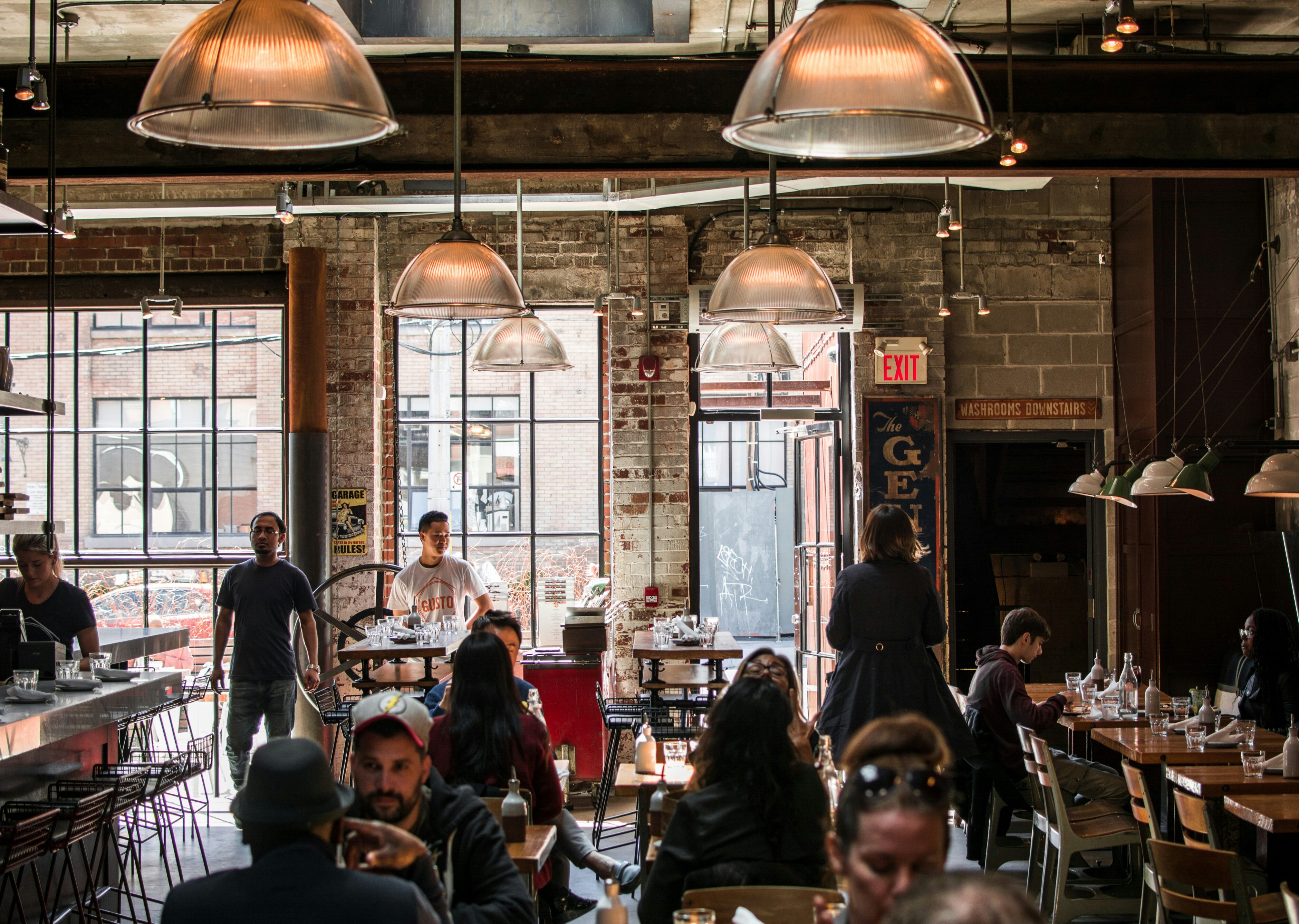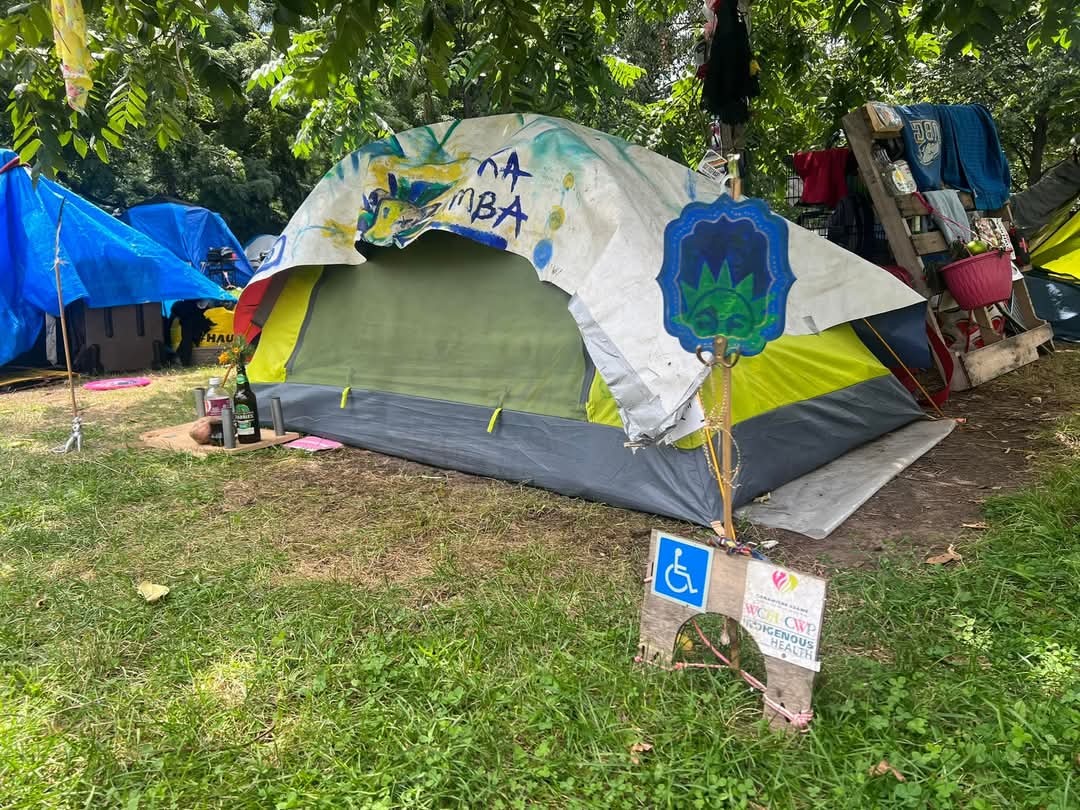Toronto once cleared the Alexandra Park homeless encampment. Here’s how the city might change its ways.
THE GREEN LINE
DOCUMENTERS NOTES
Toronto once cleared the Alexandra Park homeless encampment. Here’s how the city might change its ways.
On Feb. 6, the Federal Housing Advocate presented a report to the City of Toronto’s Housing Rights Advisory Committee on human rights approaches to homeless encampments.
Karen Chan’s tent in 2023 at Allan Gardens Park. Karen says the tent was a community-funded space for art and care, and sought to defy the city’s lack of awareness to violence against women.


Karen Chan
A Chinatown-based artist, graduate of University of British Columbia and a bunny mom. She is interested in storytelling to build community.
Feb. 13, 2025
These city meeting notes are part of Documenters Canada. Learn more about our program here.
The City of Toronto is reevaluating the way it deals with homeless encampments in parks.
In May 2021, Alexandra Park had around 100 tents. The city responded by issuing trespass notices to its residents and clearing the park — which sparked an investigation by the Ombudsman Toronto.
On Feb. 6, the Toronto Housing Rights Advisory Committee heard from Marie-Josée Houle, the federal housing advocate and from Reema Patel, the deputy ombudsman on housing, to learn about human rights-based approaches to dealing with encampments.
The committee was mandated in 2023 to provide a forum for people with lived/living experience of homelessness and housing advocates to advise City Council on relevant policies and programs.
Durint the meeting, Houle gave a presentation on “A Human-Rights Based Municipal Encampment Response.” She had been appointed in November 2022 to act as an independent and non-partisan advocate for concrete actions to respect, protect and fulfill the human rights of encampment residents.
For her national report, Houle found that basic needs such as water and safety are not met in encampments. She also found that Indigenous people, survivors of gender-violence, people of colour, people with disabilities, seniors and 2SLGBTQ folks are over-represented in encampments. (In Toronto, Indigenous people constitute two per cent of the general population yet they represent 15 per cent of people experiencing homelessness.)
Houle advocated for meaningful engagement with encampment residents as opposed to common practices of clearing encampments, which she described as “coercive actions that lead to harming the people living in encampments.” (Her findings are supported by a 2023 Ombudsman Toronto investigation that looked into the City of Toronto’s clearing of encampments in 2021. The investigation found that the city caused “undue confusion and harm” to the evicted residents — and violated their human rights when it chose to clear three encampments in Trinity Bellwoods, Alexandra and Lamport Stadium parks.)
“[Clearing encampments] causes considerable harm and doesn't engage with the underlying causes that have contributed to their homelessness," Houle added.
She explained that a human rights-based approach emphasizes urgent measures to protect life, dignity and human rights. She included key calls to actions that are meant to guide the government on both federal and municipal levels:
- Act immediately to save lives by ensuring access to basic necessities
- End forced eviction of encampments
- Meaningfully engage encampment residents
- Respect the inherent rights of Indigenous People as per the UN Declaration of the Rights of Indigenous People (UNDRIP)
- Offer people permanent housing options as soon as possible
- Address the root causes of encampments
Saroja Ponnambalam, a community planner with Social Planning Toronto and a member of the Housing Rights Advisory Committee, said she was concerned with the provincial government’s recent use of the notwithstanding clause, which is Section 33 of the Charter of Rights and Freedoms, to clear encampments. Ponnambalam asked Houle how we can respond to this issue and build solidarity against the stigmatisation of encampments.
Houle agreed with the concerns and called on the city to repeal bylaws that criminalize encampment residents. (By-law No. 854-2004, Chapter 608-13 “Camping and lodging” and By-law No. 375-2012, Chapter 743-9.Q “Fouling and obstructing streets” as noted in the Ombudsman Toronto investigation.)
“Just because you can [use outdated bylaws], doesn’t mean you should,” she added.
Dee Lee Soh, a community member who’s lived in Toronto shelters, stated that encampment residents who are moved into supportive housing can have a hard time maintaining their housing, and end up going back to encampments. In response, Houle mentioned that encampment residents should be offered more well-rounded support, including mental health counselling, cooking and cleaning workshops.
On Jan. 22, 2025, the federal government announced a plan to provide funding, which will be matched by the City of Toronto, to support people living without homes, including in encampments. But according to Houle, there hasn't been much transparency on the specifics.
Houle offered some good practices on respecting the human rights of encampment residents based on her experiences. She said “treat a tent like it's people’s home” and “put yourself in their shoes.” She added that we should treat the views of the unhoused and the housed the same.
What were the results of the discussions?
No direct actions were taken during the meeting as the motion was only to receive the information. Several committee members said that they found the presentation useful and stated that they are working in solidarity with Houle.
Anne-Marie Moulton, a social worker on the Housing Rights Advisory Committee, said that “people here are fighting for the same cause, so keep doing the good work.”
People who have experienced homelessness can also share their experiences on the Federal Housing Advocate's website.
On-the-ground observations from our Documenters
In the summer of 2023, I lived in an encampment at Allan Gardens for three months. Despite finding affordable housing months earlier, the city’s social assistance office kept refusing to disperse funding to support with the first and last month’s rent, so I fell through the cracks.
During this time, I recovered from a lot of violence on my own terms. I sought out student chiropractors and street nurses across the street at Sherbourne Health Centre. Indigenous men and complete strangers showed up with mutual aid and small acts of kindness. The Native Women’s Resource Centre let me participate in an outdoor market, and staff taught me how to jingle dance.
While living in a tent, I finally felt a sense of community, and local activists supported me to create a medical tent for people in the encampment. We dealt with a few overdoses, gave out menstrual pads, provided first aid and clothes. City employees from Streets to Homes even donated medical supplies.
However, through this experience, I saw first hand how police were called when parks employees dismantled tents.
A friend who was working in construction every day had his tent removed while he was at work. One tent resident who was also evicted decided to go live in the forest.
Eventually, I was offered housing by the city right after an assault. As I prepared to move, city staff chose expediency over my personal needs. They refused to give me enough time to deal with my injuries first. They packed up and threw out my belongings, including my tent. It had been providing shelter to two other women. All the trust built by one city team was destroyed by another — and neither took any accountability for causing harm.
The city similarly dismantled camps across different neighbourhoods in the past. In the summer of 2021, the Toronto Park Board cleared the encampment in Alexandra Park. More recently, on Dec. 10, 2024, the city cleared the last two tents at Clarence Square Park near Wellington Street and Spadina Avenue after months of safety concerns from nearby residents.
Local advocates, including Maggie Helwig from St. Stephen-in-the-Fields Church in Kensington Market, have spoken up against this approach. Helwig has said on multiple occasions that displacing people from an encampment often results in them joining another one in a few months, if not immediately. In an interview with The Green Line, she said that a harm reduction approach and housing solutions would actually be helpful to address the issue better.
Fact-Check Yourself
Sources and
further reading
Don't take our word for it —
check our sources for yourself.
Office of the Federal Housing Advocate
Care about our city, but don't know how to make it better? Sign up for simple, step-by-step guides to solving problems in your neighbourhood — one small action at a time.

